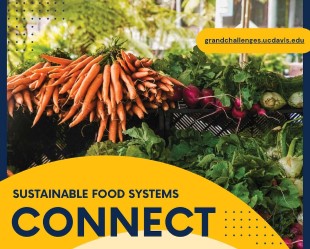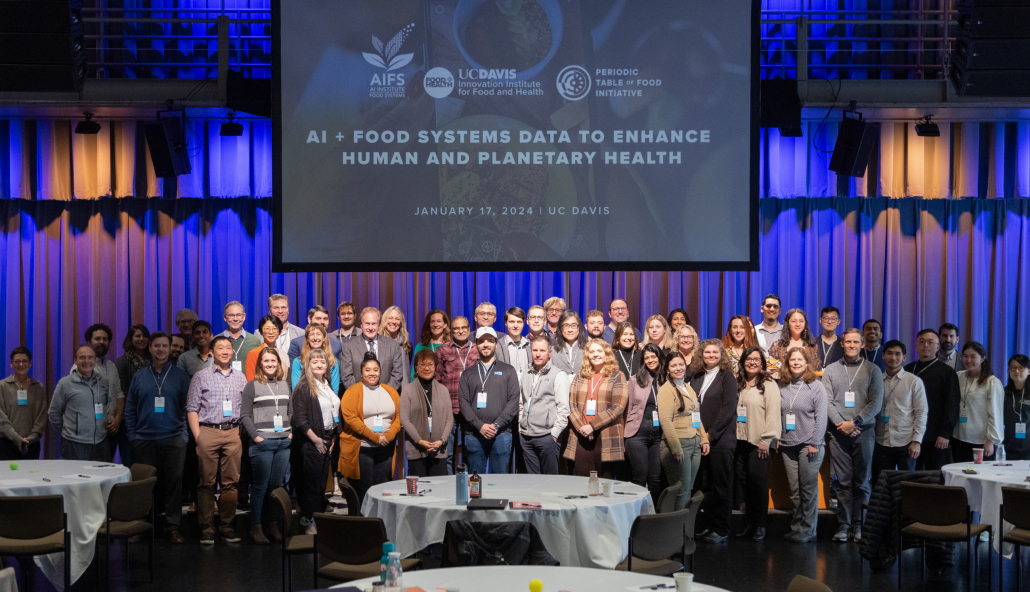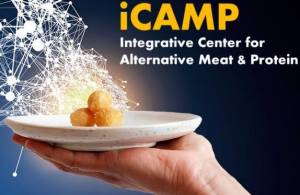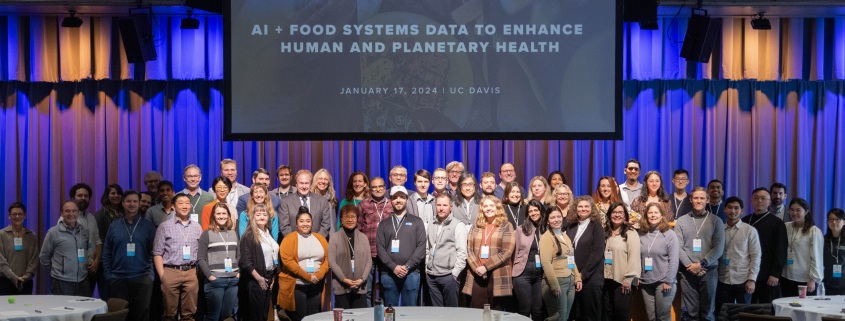Ingredients for the Food-ture: UC Davis Cooks Up Innovation
January 16-18: Campus experts hosted 3 food systems convenings
At a university renowned for breeding a better-tasting strawberry and engineering a famine-ending variety of rice, a new food revolution is surging. In a single week in January, UC Davis hosted three food innovation conferences to explore how food systems can be adapted to meet the world’s growing demands for sustainable, nutritious, and affordable foods.
UC Davis faculty and staff possess an unparalleled range of expertise across agriculture and food science, which has helped the university earn its top ranking and international recognition in agriculture and food technology. Experts in these fields participated in January’s convenings, along with leaders from industry and community groups, who brought strengths in entrepreneurship and workforce development.
“At UC Davis, we are excited to be bringing together experts from disciplines as disparate as ethical economics to organic chemistry in order to holistically improve our food systems,” said Jonna Mazet, Vice Provost of Grand Challenges. “It is time for a food revolution that will deliver wholesome food that people want to eat, at a price that makes it accessible to all.”
Cross-campus connections
On Tuesday Jan. 16, UC Davis Grand Challenges hosted a faculty, staff, and researcher networking event on campus as part of its Sustainable Food Systems Grand Challenge. “UC Davis is a huge campus with food science and agriculture touching every one of the university’s 11 schools and colleges,” said Molly McKinney, Grand Challenges’ Chief of Staff. The event was requested by researchers at UC Davis as a chance to connect, learn, and discuss research happening across campus in order to develop a comprehensive food systems agenda. “Convening experts from multiple perspectives and disciplines, with guidance by a concentrated effort and strategy, is necessary for UC Davis to make a large impact in a global food system,” said McKinney.

UC Davis Grand Challenges hosted a Sustainable Food Systems networking event on Jan. 16 to help faculty, staff, and researchers from across campus meet and discuss innovative ideas for positively impacting our world’s food systems.
More than two dozen people attended, including faculty, researchers, and staff from the university’s offices for Government Relations, Development & Alumni Relations, and Strategic Communications. The event kicked off with a networking round robin in which attendees shared responses to the prompt, “What is the most impactful/ambitious project relating to sustainable food systems that you’re currently working on or would like to be working on?” During the meeting, Grand Challenges facilitated discussions around future research directions, collaborations, and avenues for disseminating research and policy recommendations. Attendees had a chance to sign up for Strategic Communications’ Experts Lists and for opportunities to partner with the university’s government relations experts in Sacramento and Washington, DC.
Next generation food innovation
On Wednesday Jan. 17, UC Davis hosted Artificial Intelligence and Food Systems Data to Enhance Human and Planetary Health, a food systems event that focused on the use of artificial intelligence (AI) and data science to enhance the nutrition and sustainability of foods. The full-day event was co-sponsored by the UC Davis AI Institute for Next Generation Food Systems (AIFS), UC Davis Innovation Institute for Food and Health (IIFH), and Periodic Table of Food Initiative.

Experts and leaders from across UC Davis, industry, and government attended the AI + Food Systems Data to Enhance Human and Planetary Health event on Jan. 17 (Photo credit: Phong Duong).
With 11 keynote speakers and over 60 registrants, discussions at the conference examined the use of AI and data science to improve how we employ technology for sustainable farming and to design new bioactive ingredients that unlock and enhance the nutritional potential of food. Food and agriculture technologies are advancing rapidly, and stakeholders in these industries are racing to identify scientifically sound, data-driven solutions to improve human and planetary health, according to Veronica Keys, Program Assistant for IIFH.
The diverse line-up of topics offered a close look at components of the research pipeline that are needed to integrate AI with food systems, from developing the data infrastructure to the direct links to farming, human health, and planetary wellness. “This event serves as a meeting ground for collaboration across disciplines, backgrounds, and geographies to drive forward innovative solutions that are both good for people and the planet,” said Keys. Transdisciplinary conversations like these are critical for safely developing new technologies that can have such profound impacts on the world. As home to one of the few National Artificial Intelligence Research Institutes that bridge AI and food systems, UC Davis proudly hosts these talks as it works to responsibly evolve food systems technology for the betterment of humanity and our planet.
New meats (and proteins) on the block
The third food event in the week was the two-day launch of the Integrative Center for Alternative Meat & Protein (iCAMP), which spanned Wednesday Jan. 17 and Thursday Jan. 18 at the UC Davis Robert Mondavi Institute of Wine and Food Science. As the world’s population approaches 10 billion people, demand for protein will skyrocket and overwhelm our current food systems. Current estimates suggest protein demand could double in the next 25 years, according to Kara Leong, iCAMP’s Executive Director. iCAMP’s mission is to meet this growing demand by creating new sources of protein, including fungal-based meats and cultured animal meats, that are healthy, flavorful, and sustainable.

The Integrative Center for Alternative Meat & Protein at UC Davis was launched on Jan. 17 and 18.
On Wednesday, iCAMP hosted 36 speakers, many of whom came from iCAMP’s partners at the USDA, UCLA, Culinary Institute of America, University of Maryland – Baltimore County, and Solano Community College. The speakers brought expertise ranging from food science to workforce development and discussed each element of the production pipeline for alternative meat and proteins. “We wanted to showcase the breadth of our research, the breadth of our programs, and how we’re working with industry,” said Leong.
Experts at the event agreed that the technology is ready to be moved from the small-scale production of research laboratory benches to the large-scale production needed for commercialization and public consumption, an expansion that Leong calls “from bench to scale.” Wednesday’s sessions ended with a panel discussion about the Sacramento region’s capacity for scaling up alternative protein production, which iCAMP hopes to facilitate by creating a network of local researchers, businesses, and investors in the food technology and alternative protein sector.
On Thursday, iCAMP held a Partners Retreat, attended by representatives from academia, industry, and economic development groups. The goal for the day was to discuss iCAMP’s plan for building a strong global and regional network of strategic partners and to receive constructive feedback from key stakeholders. Establishing partnerships, collaborations, and an interactive ecosystem are iCAMP’s highest priorities, according to Leong. “We are happy to speak to industry, non-profits, governmental organizations – with all who are interested in what we are doing and becoming involved with our new center of excellence,” said Leong.
Campus-wide commitment to sustainable food systems
The events of last week were an inspiring alignment of food systems research at UC Davis and across its network of partners, representing a full pipeline from ideation to implementation. Grand Challenges provides the broader ecosystem for facilitating partnerships and access to resources within food systems research; AI researchers in AIFS and IIFH develop novel ingredients to unlock a new generation of healthy, nutritious foods; and iCAMP accelerates the translation of alternative meat and protein from benchtop discoveries to large-scale commercialization. The unique set of food expertise at UC Davis – unified under a single vision for sustainability, health, and equity – fuels the university’s unparalleled strengths in agriculture and food science and promises a bright future for its positive impact on the world’s food systems.





